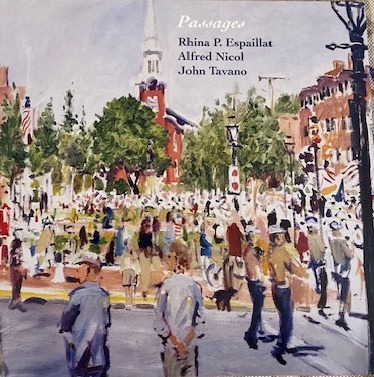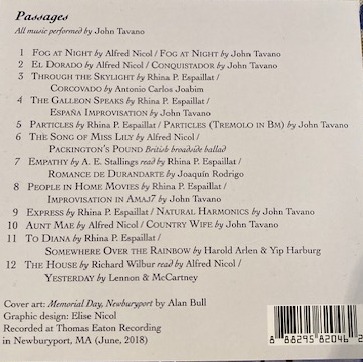
As regular readers know, I am interested in the relationships between poet and other art forms, in how the works in one art form inspire or converse with each other. A few years ago, a friend, Beth Clary, gave me a copy of a remarkarble recording that draws connections between poetry and melody, that explores the ways in which sound and sense align: the country of “melopoeia.”
As Ezra Pound had it, “Melopoeia or melopeia is when words are “charged” beyond their normal meaning with some musical property which further directs its meaning,[1] inducing emotional correlations by sound and rhythm of the speech.”
In 2018, a trio comprised of poet Rhina P. Espaillat, poet Alfred Nicol, and composer John Tavano recorded a remarkable CD in their arts-rich city of Newburyport, Massachusetts called “Passages”. This recording was an outgrowth of the renowned Newburyport Chamber Music Festival, and a product of that vibrant arts community. The cover art, by Alan Bull, is from a painting called, “Memorial Day, Newburyport;” the graphic design was contributed by Elise Nicol; and the CD was recorded at Thomas Eaton Recording in Newburyport.

As you can see, the readings are shared by poets Espaillat and Nichol, and include not only their own poems but one each by A. E. Stallings and Richard Wilbur. The music is all performed by Tavano, and most is composed by him , but he also includes effective arrangements of “Packington’s Pound,” a British broadside ballad; “Somewhere Over the Rainbow,” by Harold Arlen and Yip Harburg; and “Yesterday,” by John Lennon and Paul McCartney.
Listening again recently to these many-layered recordings has made me more aware of the melodic qualities of individual words and of how much enjoyment I derive from the sound of language as well as its sense. In fact, while others might disagree, I conclude a poem requires at least as much attention to the sonic quality of the lines (the artistic deployment of such elements as rhythm and meter, alliteration, assonance, dissonance, and rhyme) as it does in its “reason” or arguement or sense.
While this is not a brand new thought for me, listening again to “Passages” makes me realize afresh that a large share of the joy of reading and writing (and memorizing!) a poem comes from sound itself.
I hope today that music, in any of its many forms, flows into your world, embellishing it and carrying you away, if only for a moment! LESLIE


Hey, Jan,
This is interesting! I will look at it over the weekend! 🙂
Thank you for posting about these poets/musicians. I found the following on YouTube and it sounds so familiar. I may have heard or read “Bilingual/Bilingue” before. You open the world. https://youtu.be/aNSEoNW90rQ?si=pR9FRnwBP8N5pHru
Thank you, Beth, for helping me to focus my understanding a little more clearly!
What a lovely surprise! Thank you for this, all of this and reminding me of this recording. Think I’ll have a listen!